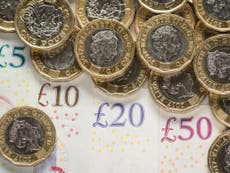My message to savers is to wait and try not to worry about interest rates
Governments are bigger than we are. But we have a longer time horizon – we don’t have to get re-elected, writes Hamish McRae


What should savers do now?
In Britain, the national debt has risen above 100 per cent of GDP, and so far this year, the government has borrowed as much as it did in the aftermath of the crash of 2008 and 2009. We can’t know where the deficit will end up, because that 100 per cent figure is made larger by the collapse in GDP, but it will be a five-year slog to get the deficit down to some sort of balance.
It seems reasonable to expect national debt to settle down (or rather up) at somewhere between 100 per cent of GDP, if there is a strong economic rebound, and 110 per cent – or even more – if there isn’t. This will be the highest debt-to-GDP ratio since the 1960s, when we were paying off the debts incurred during the Second World War.
Some academics take the view that these debts don’t have to be paid back, and that deficits don’t matter. But in the real world they do. The two large developed countries that have the highest debt-to-GDP ratios, Japan (240 per cent) and Italy (140 per cent), have been the slowest-growing economies recently.
That is a two-way relationship, for low growth makes it harder to reduce debt. While there is no set debt ceiling, and the US can get away with higher debt because of the power of the dollar, governments everywhere else will have to show a pathway to debt reduction.
What do you do if you are over-borrowed? You try and hold down interest rates. Ideally, you hold them below inflation, as governments did in the 1950s and 1960s when they were funding the war debt. It was a period that was great for borrowers, particularly those who bought a home on a mortgage, and it was bad for savers, particularly those who bought government debt.
We are going to have another period like that now. The parallels are never exact in finance; it would all be too easy if they were. However, I think we can assume that governments and their central banks will succeed in holding interest rates down near to zero for another five years, and that they will continue to find excuses to create huge amounts of liquidity. The world will be awash with money, and not necessarily, I fear, in the right places.
Eventually, this money will feed through into inflation in goods and services, but we cannot know how long this will take. I think it will come through more quickly than people expect, though that may be wrong. Meanwhile, anyone with any savings, or trying to save, is faced with a huge challenge. What on earth do you do, given that the world’s governments and central banks are trying to beat you down?
In the first couple of decades after the Second World War, there was a general rule that if people could afford to buy a home on a mortgage, they should do so. Successive governments added to the incentives for home ownership, including income tax relief on mortgage interest payments.
Beyond that, not holding any government stock, however unpatriotic that might seem, was another good rule. Instead, long-term investment in large UK companies – the so-called cult of the equity – turned out reasonably well. But you had to pick sectors that would prosper and avoid those, such as the motor manufacturers, that had begun to decline.
And now? The first rule still applies; for, despite obvious problems in parts of the market, overall house prices in the UK are at an all-time high. The second rule of avoiding government debt still applies too. The problem now is what to do with spare cash.
In one way, things are easier now than in those post-war years. They are easier because we can invest abroad. There were restrictions then on moving money out of the country, including having to buy currency for investment out of a pool, usually at an adverse rate. It may be hard to imagine now, but exchange controls lasted until 1979, more than 30 years after the war had ended.
But in another way, things are harder because of the great wall of money that has driven up global securities, particularly in the US. With a few exceptions, British assets remain pretty unfashionable, the pound deeply so, for all the obvious reasons. It is a rough time for anyone earning and saving in sterling.
Fashions, in finance as in everything else, do change, however. Remember the bombast of the years of Tony Blair and Gordon Brown? People bought it. Back in 2007, just before the crash, the pound was worth over $2. So I suggest the message to savers is to wait and not to worry. Spread risks, set aside any dividends, and rely on compound interest to build savings.
Governments are bigger than we are, but we have a longer horizon of time – we don’t have to get re-elected.




Join our commenting forum
Join thought-provoking conversations, follow other Independent readers and see their replies
Comments